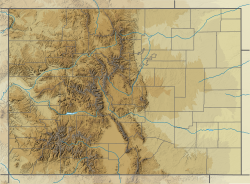DeBeque Formation
| DeBeque Formation Stratigraphic range: Late Paleocene-Early Eocene (Clarkforkian-Wasatchian) ~ | |
|---|---|
 Fossil from the DeBeque Formation | |
| Type | Formation |
| Sub-units | Atwell Gulch Member |
| Lithology | |
| Primary | Claystone |
| Location | |
| Coordinates | 40°00′N 107°54′W / 40.0°N 107.9°WCoordinates: 40°00′N 107°54′W / 40.0°N 107.9°W |
| Approximate paleocoordinates | 44°48′N 91°48′W / 44.8°N 91.8°W |
| Region | |
| Country | |
 DeBeque Formation (the United States) | |
The DeBeque Formation is a geologic formation in Colorado's Piceance Basin,[1] preserving fossils which date back to the Late Paleocene to Early Eocene period (Clarkforkian to Wasatchian in the NALMA classification.[2][3] Examples of these fossils are held in the University of Colorado Museum of Natural History.[4]
Wasatchian correlations[]
| Formation | Wasatch | DeBeque | Claron | Indian Meadows | Pass Peak | Tatman | Willwood | Golden Valley | Coldwater | Allenby | Margaret | Nanjemoy | Hatchetigbee | Tetas de Cabra | Hannold Hill | Coalmont | Cuchara | Galisteo | San Jose | Ypresian (IUCS) • Itaboraian (SALMA) Bumbanian (ALMA) • Mangaorapan (NZ) | ||
|---|---|---|---|---|---|---|---|---|---|---|---|---|---|---|---|---|---|---|---|---|---|---|
| Basin | Powder River Uinta Piceance Colorado Plateau Wind River Green River Bighorn |
Piceance |
Colorado Plateau |
Wind River |
Green River |
Bighorn |
Williston | Okanagan | Rio Grande | North Park | Raton | Galisteo | San Juan | |||||||||
| Country | ||||||||||||||||||||||
| Copelemur | ||||||||||||||||||||||
| Coryphodon | ||||||||||||||||||||||
| Diacodexis | ||||||||||||||||||||||
| Homogalax | ||||||||||||||||||||||
| Oxyaena | ||||||||||||||||||||||
| Paramys | ||||||||||||||||||||||
| Primates | ||||||||||||||||||||||
| Birds | ||||||||||||||||||||||
| Reptiles | ||||||||||||||||||||||
| Fish | ||||||||||||||||||||||
| Insects | ||||||||||||||||||||||
| Flora | ||||||||||||||||||||||
| Environments | Alluvial-fluvio-lacustrine | Fluvial | Fluvial | Fluvio-lacustrine | Fluvial | Lacustrine | Fluvio-lacustrine | Deltaic-paludal | Shallow marine | Fluvial | Shallow marine | Fluvial | Fluvial | |||||||||
| Volcanic | Yes | No | Yes | No | Yes | No | Yes | No | Yes | No | ||||||||||||
See also[]
References[]
- ^ Bown & Kihm, 1981
- ^ DeBeque Formation at Fossilworks.org
- ^ Hirsch et al., 1997
- ^ "Collections". Museum of Natural History. 24 May 2016. Retrieved 10 November 2019.
Bibliography[]
- ; , and . 1997. New Eggshell of Ratite Morphotype with Predation Marks from the Eocene of Colorado. Journal of Vertebrate Paleontology 17. 360. ISSN 0272-4634 JSTOR 4523812 doi:10.1080/02724634.1997.10010980
- , and . 1981. Xenicohippus, an Unusual New Hyracotheriine (Mammalia, Perissodactyla) from Lower Eocene Rocks of Wyoming, Colorado and New Mexico. Journal of Paleontology 55. 257. ISSN 0022-3360 JSTOR 1304347
Further reading[]
- A. J. Lichtig and S. G. Lucas. 2015. Paleocene-Eocene turtles of the Piceance Creek Basin, Colorado. New Mexico Museum of Natural History and Science Bulletin 67:145-152
- A. J. Kihm. 1984. Early Eocene Mammalian Fauna of the Piceance Creek Basin. Northwestern Colorado
- K. P. Schmidt. 1938. New crocodilians from the upper Paleocene of western Colorado. Geological Series of Field Museum of Natural History 6(21):315-321
Categories:
- Geologic formations of Colorado
- Eocene Series of North America
- Paleocene Series of North America
- Paleogene Colorado
- Thanetian Stage
- Ypresian Stage
- Clarkforkian
- Wasatchian
- Sandstone formations
- Fluvial deposits
- Ooliferous formations
- Fossiliferous stratigraphic units of North America
- Paleontology in Colorado
- Western United States geologic formation stubs
- Colorado geography stubs
- Paleogene stubs


